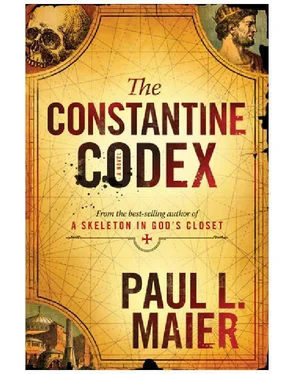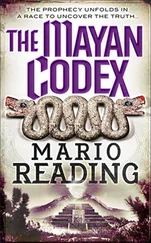Paul Maier - The Constantine Codex
Здесь есть возможность читать онлайн «Paul Maier - The Constantine Codex» весь текст электронной книги совершенно бесплатно (целиком полную версию без сокращений). В некоторых случаях можно слушать аудио, скачать через торрент в формате fb2 и присутствует краткое содержание. Жанр: Триллер, на английском языке. Описание произведения, (предисловие) а так же отзывы посетителей доступны на портале библиотеки ЛибКат.
- Название:The Constantine Codex
- Автор:
- Жанр:
- Год:неизвестен
- ISBN:нет данных
- Рейтинг книги:5 / 5. Голосов: 1
-
Избранное:Добавить в избранное
- Отзывы:
-
Ваша оценка:
- 100
- 1
- 2
- 3
- 4
- 5
The Constantine Codex: краткое содержание, описание и аннотация
Предлагаем к чтению аннотацию, описание, краткое содержание или предисловие (зависит от того, что написал сам автор книги «The Constantine Codex»). Если вы не нашли необходимую информацию о книге — напишите в комментариях, мы постараемся отыскать её.
The Constantine Codex — читать онлайн бесплатно полную книгу (весь текст) целиком
Ниже представлен текст книги, разбитый по страницам. Система сохранения места последней прочитанной страницы, позволяет с удобством читать онлайн бесплатно книгу «The Constantine Codex», без необходимости каждый раз заново искать на чём Вы остановились. Поставьте закладку, и сможете в любой момент перейти на страницу, на которой закончили чтение.
Интервал:
Закладка:
Shannon, too, was deeply moved. Hagia Sophia-Greek for “Holy Wisdom”-had been constructed 1,500 years ago by the great Byzantine emperor Justinian, who, on dedication day in AD 537, declared proudly, “Solomon, I have outdone thee!” He had indeed, with this first and largest domed structure in the world, the Christian exemplar from which every domed Muslim mosque since that time was patterned. And Hagia Sophia would be the place where the Muslim-Christian debate would take place that could change all of their lives.
“It’s such a shame that the Muslim conquerors added those minarets,” Shannon said. When Constantinople was taken over in 1453, the cathedral had been converted into a mosque. A mosque? Wait a minute…
“Jon, you can’t be planning to debate a Muslim opponent inside a mosque?”
He looked surprised. “Why not? I’m a generous sort and don’t mind giving him some home-field advantage.”
As he chuckled, the rest of her history knowledge fell into place. “Wait, I recall now. Ataturk, the founder of modern Turkey, converted Hagia Sophia from a mosque into a secular public museum.”
“Precisely.” Jon grinned. “But you were worried there for a minute, weren’t you?”
She swatted him playfully and sat back to enjoy the sights. Through crowded streets scented with dozens of different spices and jammed with humanity buying or selling at hundreds of open-air markets, the limos threaded their way down to the waterfront of the fabled Golden Horn. This was the inlet from the Bosporus-gilded each sunrise and sunset-that split the city and set off the triangular peninsula tip that was the heart of Istanbul. They crossed the Galata Bridge and drove up another hill in the eastern sector of the city, atop which stood the Istanbul Hilton, their headquarters while in Turkey.
Jon and Shannon’s suite was on the top floor of the Hilton, and they walked out onto their balcony to take in the commanding view to the south and west. Below them sprawled the great Turkish metropolis, with millions of citizens packed into its boulevards, parkways, streets, and alleys. To the south flowed the majestic Bosporus, that great waterway channeling water from the Black Sea into the Sea of Marmara and eventually into the Aegean and Mediterranean. The ominous drone of ships’ horns filled the air as ferries scuttled between Europe and Asia-a distance no more than the width of the waterway at that point. On a north-south axis, the ferries had to interweave themselves between the huge cargo ships sailing an easterly-westerly vector, their staccato horn blasts advertising a near miss from time to time.
A knock on the door of their suite interrupted Shannon’s reverie. They walked back from the veranda, and Jon opened the door. It was their two “guardian angels” from the CIA who wanted to sweep the room for any listening devices. Their code names were merely Click and Clack-perhaps in honor of the Tappet brothers on National Public Radio?-and they brushed off all requests for further identification, genially but firmly. Despite their best efforts, no bugs were found.
“Still,” Clack advised, “I wouldn’t mention anything supersensitive inside here.”
“Do we go out onto the balcony, then?” Jon asked.
“Never! Anyone down below could home in on you with telescopic audio.”
Shannon sighed. It seemed that from now on, the panoramic view would have to be enjoyed from within the safe confines of their suite.
Early the next afternoon, Jon and Shannon had an audience with the personage who had innocently lured them almost halfway across the world, the man with the official title, His All Holiness, Bartholomew II, Archbishop of Constantinople, New Rome and Ecumenical Patriarch, who was the 271st successor to the Apostle Andrew. Jon had already met and enjoyed instant rapport with the eastern pope at the Vatican III Council in Rome, the ecumenical conclave where a potential disaster to Christianity had been avoided.
The Eastern Orthodox Patriarchate was located on the eastern edge of the old city just north of the Sultan Selim mosque and overlooking the Golden Horn. The patriarchate was heavily walled-as was so much in that area of the world-but here with more reason. It had been subject to repeated bomb attacks by Muslim terrorists in recent years-a fact deplored by the secularist government of Turkey and the reason there was an official guard station near the entrance.
Inside the gate, Jon and Shannon received a warm welcome from an aide to the patriarch and were given a brief tour of the premises, including St. George’s Chapel with its great chandeliers of shimmering crystal. In the reception hall stood a lofty dais on two levels. On the upper dais was a throne to seat not a human being but a beautifully illuminated Bible, attesting to the supremacy of Scripture. Immediately in front of it but on the lower dais stood the patriarch’s throne of gold with red silk cushions that Bartholomew would have occupied were this a state reception.
Jon and Shannon were received instead at the patriarch’s residence across the courtyard, where the great man himself greeted them with surprising warmth and excellent English. “I bid you welcome in the name of our sovereign Lord, Professor Weber, and also to you, madam.”
“This is my wife, Shannon, Your All Holiness,” Jon explained. “Thank you for this gracious audience.”
He bowed slightly. “No, it is our Christian community in Turkey and I who must extend gratitude to you for coming to defend our faith here in the heart of Islam.”
Bartholomew closely matched Jon in height, though with a stockier frame. He was a figure of authority in his late sixties, attired in a robe of basic black and clutching what was either a bishop’s staff or something of a tall cane-perhaps both. His face, animated with a pair of blazing blue eyes and a broad smile, was edged by a great beard of almost gleaming white that began at his temples and plunged downward halfway to his cincture. A large golden medallion with the heraldry of his office dangled from a chain, apparently having escaped the frosty forest that covered half his chest. By any standards, this was one striking man.
The patriarch ordered refreshments and led them to his office, which had an expansive view of the Golden Horn. Predictably, they first discussed the forthcoming debate and their respective roles in that exchange. When Shannon joined the conversation, her queries were usually about security matters, particularly when Bartholomew told of the series of bombings at the patriarchate. Inevitably, this begged her question, “How safe are Christians in Turkey, Your All Holiness?”
“As you must know, Madame Weber,” he replied, “even though Istanbul is at the dividing line between the Christian West and the Muslim East, Christians number less than one percent of the Turkish population, and we do have a militant Muslim minority that does not mean us well. However, the founder of modern Turkey, Mustafa Kemal Ataturk, decreed that this nation would be a secular -not a religious-state, and the army has always enforced that mandate, even to the point of overthrowing several Turkish governments in the past that tried to favor Islam. At present, even though the religious parties seem to be growing in power, I truly believe the Turkish government will remain secular and provide us the protection that we need.”
Jon could hardly wait to bend the conversation in a new direction. Truth to tell, his ultimate goal was less to pit Christianity against Islam-he had not sought the debate, after all-and more to search the archives of the Eastern Orthodox Patriarchate for precious manuscripts. He used history as his segue.
“Your All Holiness,” he began deliberately after a slight lull in their dialogue, “here in Constantinople-and I prefer to use its time-honored name-we have probably the most extraordinary city in the world. I find it remarkable that after Rome fell, New Rome-Constantinople-survived for another thousand years. It was this city, this cork in the bottle of Muslim expansionism, that virtually saved Christianity in eastern Europe. In the West, Islam rolled across North Africa, crossed at Gibraltar, conquered Spain, and then invaded France until the Muslim forces were finally stopped just south of Paris. But for Constantinople, the same could have happened in the East.”
Читать дальшеИнтервал:
Закладка:
Похожие книги на «The Constantine Codex»
Представляем Вашему вниманию похожие книги на «The Constantine Codex» списком для выбора. Мы отобрали схожую по названию и смыслу литературу в надежде предоставить читателям больше вариантов отыскать новые, интересные, ещё непрочитанные произведения.
Обсуждение, отзывы о книге «The Constantine Codex» и просто собственные мнения читателей. Оставьте ваши комментарии, напишите, что Вы думаете о произведении, его смысле или главных героях. Укажите что конкретно понравилось, а что нет, и почему Вы так считаете.












